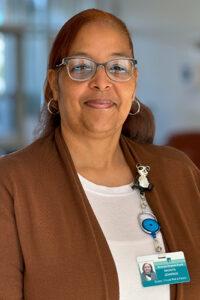Quality and Risk Management Department, 5th Floor, General Wing, KEMH
8am to 4pm Monday to Friday
Tel: (441) 239-1425 Email: PFAC@bhb.bm
BHB’s Patient & Family Advisory Council (PFAC) began in January 2019 with a dynamic group of 10 participants – including patients, patient family members and staff – sharing their experiences of care at the hospitals.
The Council has been on an extended hiatus due to scheduling conflicts starting in late 2019, followed by the global COVID pandemic. We are happy to reintroduce the PFAC with more fluid participation requirements that we hope will better accommodate our advisors’ schedules. Ultimately, this will allow a more diverse group of people to contribute to improving patient experiences at BHB.
The Council will align with the BHB Strategic Plan 2021-2026 and our vision, ‘To pursue excellence through improvement, to make Bermuda proud.’

Maxayn Jennings, PFAC Facilitator and Patient Relations Manager
We welcome applications on a continuing basis, using the application form linked below. If you would like more information about participating in the PFAC, please contact Maxayn Jennings at (441) 239-1425 or PFAC@bhb.bm.
- BHB Patient and Family Advisory Council – Application for Volunteers
- BHB Patient and Family Advisory Council – FAQs for Volunteers
About the Patient & Family Advisory Council
What is the Patient & Family Advisory Council?
The PFAC is a formal partnership comprising patient, family member and employee volunteers who serve as advisors, helping to make informed recommendations to the organisation. By sharing their unique experiences and perspectives, advisors make a difference in the care experience of the patient. BHB welcomes open and honest discussions and information sharing with the PFAC advisors.
Who sits on the Council?
Community advisors are patient/family advisors who have experienced patient care at BHB within the past two years. The Council is supported by a physician, a BHB Executive Team member and staff members, along with administrative support, to ensure the Council is well connected to the work of the organisation. We have also added a subsidiary role, virtual advisors. Community advisors and virtual advisors participate on a voluntary basis.
What is a virtual advisor?
Individuals who have experienced patient care at BHB are invited to join an online community dedicated to providing critical feedback about our health system. Together with the community advisors on the Council, virtual advisors’ insights are instrumental in helping the organisation to improve services and create a better patient experience. Virtual advisors do not take part in council meetings.
How do virtual advisors participate?
Virtual advisors are emailed a link to a short survey several times a year. Each activity takes less than 15 minutes to complete. Each advisor’s feedback will be grouped anonymously with the responses of the other virtual advisors – an individual’s name will never be linked to their comments. The Council shares the group survey results with the virtual advisors, along with updates on any actions that result from their feedback.
What are the terms of membership for community advisors?
Community advisors are asked to participate on the Council for a minimum commitment of three months, and are welcome to serve for up to one year. The co-chairs are required to make a one-year commitment. Terms are organised with appropriate overlap to ensure consistency of membership.
What are the requirements for participation for community advisors?
An application process is required for those interested in volunteering on the Council, and applicants will be considered based on personal attributes and their care experience. Community advisors must have these qualities: good communication skills, respectful attitude towards others, ability to interact well with different types of people, and ability to work effectively in partnership with others. Virtual advisors take part in a few surveys over the course of a year, where their feedback on potential projects is shared and considered.
How often does the Council meet?
The PFAC meets a minimum of eight times per year – in April, May, June, September, October, November, January and February – and at the request of the chairperson. Meetings are one hour in length and are usually held in the evenings. Virtual advisors do not take part in council meetings.
What are the duties and responsibilities of the Council?
Community advisors assist in the valuable work of providing the patient and family perspective for various projects and work undertaken by BHB, by contributing at PFAC meetings and participating in subcommittee work or other engagement opportunities where possible. Volunteers are asked to serve as advisors, not as advocates: an advisor seeks to inform a process, while an advocate seeks to ensure a particular outcome.
Other duties and responsibilities for community advisors include:
- to advise BHB on meeting the needs of patients and families through teamwork with staff
- to participate as partners in the planning and operations of specific programmes within the PFAC’s mandate
- to respond to requests for patient/family advisors to participate on committees, taskforces and working groups
- to provide a forum for patients and families to identify opportunities to improve the quality of care and to participate in quality improvement initiatives at BHB
- to promote opportunities for collaboration among patients, families and staff at BHB
- to advance patient engagement and people-centred care in all services provided by BHB
- to prepare an annual work plan and PFAC report
What are the advisory positions and how can I apply?
Community roles:
- co-chairs (2)
- community advisors
- virtual advisors
If you are interested in applying for one of these roles, please visit bermudahospitals.bm/PFAC or email PFAC@bhb.bm to request an application form. Alternatively, application forms can be collected from the Quality & Risk Management Department on the fifth floor of the King Edward VII Memorial Hospital General Wing.
